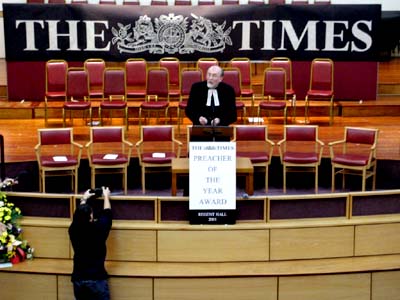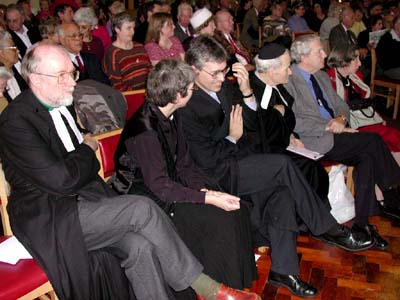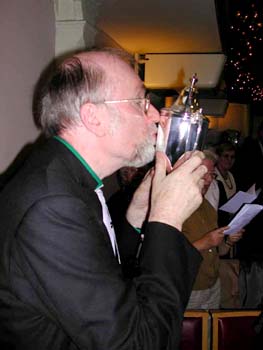 |
|

The church: Regent Hall, 275 Oxford Street, London W1.
Denomination: Salvation Army.
The building: The tiny entranceway on Oxford Street leads to a reception area, cafe and the hall itself. This is shaped like a mini aircraft hanger from the 1950s, with curved steel girders in the roof. The hall is immaculately decorated, with a choir-sized stage and gleaming grand piano, plus a balcony around three sides. Built on the site of an old ice rink, the hall was opened by General William Booth himself in 1882 and is still known affectionately as "The Rink".
The church: They describe themselves as "an evangelical Salvation Army church in the West End of London." The church runs outdoor services and marches, plus soup runs and other outreach work to London's homeless people. Then there are the Regent Hall Songsters and Band, as you'd expect from a Salvation Army church.
The neighbourhood: Just the world-class shops of Oxford Street. The church is a few yards away from Oxford Street tube station.
The cast: Ruth Gledhill, religion correspondent for The Times, gave the opening welcome. Colonel Margaret Hay (who won last year's competition) compered the event. The preachers were (in order of appearance): Rev. Alison Adams, Rev. Martin Camroux (pictured above), Rabbi William Wolff, Ian Knox and Rev. Richard Warden.
The Final of The Times Preacher of the Year Award. This was the final preach-off for five finalists, chosen from a field of 250 hopefuls. A £1,500 prize and eternal fame was in store for the winner.
How full was the building?
Completely packed downstairs and about one-third full upstairs, which is where I sat. I estimated about 300 people in all, mostly of the middle-age and up variety. One of the organisers told me that people had started arriving and claiming their seats at 9.30am. The event began at 2.00pm.
Did anyone welcome you personally?
Stewards were on the doors handing out service booklets, but they weren't greeting people.
Was your pew comfortable?
Yes. Upstairs has tired-looking cinema seats, but my bottom didn't complain. Downstairs has modern padded seats which look luxurious.
How would you describe the pre-service atmosphere?
Keen and excited. Clearly, the groupies for each of the five preachers were out in force. Just before the event got started, the Wapping Great Voices took over – a 14-strong choir drawn from News International staff. They entertained us with an enthusiastic rendering of something religious before heading back to their desks at The Times, Sun and News of the World.
What were the exact opening words of the service?
Ruth Gledhill greeted us with a cheery, "Good afternoon and welcome, everyone!"
What books did the congregation use during the service?
A booklet complete with competition details and hymns.
What musical instruments were played?
The grand piano, played by Alexander Mason. And the shofar (the Jewish ram's horn) played at the opening of the event by Harry Pitch, whose face turned an impressive shade of deep red as he held the long notes.
Did anything distract you?
Only my sinful unbelief that 300 people would willingly submit to the ordeal of hearing five sermons, one after the other, in one afternoon.
Was the worship stiff-upper-lip, happy clappy, or what?
The worship consisted of hymn singing, with a hymn at the end of each sermon. The singing was respectably loud, with the last hymn veering dangerously close to "rousing".

Exactly how long was the sermon?
12 minutes each, making a total of 60 minutes of sermoneering.
On a scale of 1-10, how good was the preacher?
In my humble opinion...
Alison Adams: 4
Martin Camroux: 5
Rabbi William Wolff: 4
Ian Knox: 7
Richard Warden: 4
The judges made Martin Camroux the winner, with Ian Knox in second place. I have to say that Mr Knox looked "gutted", which says something about the intensity of this event. None of the preaching was exceptional, which was most disappointing.
In a nutshell, what was the sermon
about?
One by one...
Alison Adams spoke on "The kingdom of God belongs to such as these," and tackled the subject of how the church can work in today's world. Her script was dense and rich in content. However, with no humour and absolutely no movement of her body the whole time she was speaking, Alison deserved a prize for least theatrical speaking style. She did have a dramatic opening story about a neglected young boy called Jason, though. Best quote: "If Jason's choice is between an old man on a cloud or being a collection of atoms, we are selling him short."
Martin Camroux's title asked, "Why can't we live together?", and he focused on intolerance. His sharp, reedy voice and his black Methodist preaching gown (topped by large white tabs) commanded attention, but apart from waving his arms around a bit, his delivery was mostly dull, with no highs or lows. Martin criticised the government's proposal to criminalize incitement to religious hatred, though, and he told a story at the beginning which generated real, gutsy laughter in the congregation. Best quote: "Christ is the hope of the world. Finding him is finding out how we can live together."
Rabbi William Wolff had the most promising sermon title of them all: "The back seat driver". The congregation readied itself for some good Jewish storytelling and wit... but sadly, it never happened. Maybe it was because I was in the balcony, but William's voice was muffled, as though he was talking through a pillow, and I missed 50 per cent of what he said. He spoke on the balance between being responsible for our actions and accepting the things which are beyond our control. Best quote: "One moment we are drivers on life's journey and the next we are mere passengers."
Ian Knox's title was "Song for today" and was a loose exposition of Psalm 23. Ian was the only preacher in secular dress: grey business suit and tie. He spoke without looking at his notes, moved around quite a lot and really... well... preached – but maybe being an old-style evangelist with preaching as his bread and butter put him at an advantage in the competition. I'd have made him winner, but not by much. Despite speaking directly to the congregation, his style seemed rehearsed and professional rather than heartfelt. Best quote: "David's faith worked best when things went wrong."
Richard Warden was the youngest of all the preachers and his subject was, "A future for faith". His style was understated, his arm movements modest, and I'm sure his blood circulation experienced no surges during the talk. The most exciting moment was when he took a stone picked up on Mt Sinai during a recent trip there and held it up for us to see. In fact, this was the most interesting moment in all the sermons we heard, no one else breaking out of the purely aural approach to preaching. Best quote: "Rather than throwing stones, let's remember what was once carved on stone: to love God with all our hearts and our neighbours as ourselves."
Which part of the service was like being in
heaven?
The moment when Ian Knox extended both his arms horizontally, which turned out to be the most dramatic piece of body language during an otherwise body language-free afternoon. At this point, the paparazzi sitting on the carpet sprang to life, flashguns went off and motor drives whirred. Ian obligingly held the pose till things calmed down. Sadly, nothing more numinous than this was on offer.
And which part was like being in... er... the other place?
Hearing Alison Adams use the word "ecclesiology" in a sermon meant for general consumption.
What happened when you hung around after the service looking lost?
I was picked up by people who knew me.
How would you describe the after-service
coffee?
I was handed a plastic cup with hot water and a depressing-looking tea bag bobbing about in it. Coffee was also available.
How would you feel about making this church your regular (where 10 = ecstatic, 0 = terminal)?
1 – I don't think this would be my... ahem... cup of tea.
Did the service make you feel glad to be a
Christian?
Yes. I took away some good, interesting ideas to think over, and despite feeling critical of their presentation skills, I appreciated the energy the preachers had put into their preparation.
What one thing will you remember about all this in seven days' time?
Getting a picture of Martin Camroux, the winner, kissing the cup Wimbledon-style, while the congregation sang the final hymn, "Praise my soul the king of heaven." Truly a surreal church moment.

| The Mystery Worshipper is sponsored by surefish.co.uk, the internet service provider from Christian Aid. By offering email services, special offers with companies such as amazon.co.uk and smile.co.uk, surefish raises more than £300,000 a year for Christian Aid's work around the world. Click here to find out how to become a Mystery Worshipper. And click here if you would like to reproduce this report in your church magazine or website. Top | Other Reports | Become a Mystery Worshipper! © Ship of Fools 2001 |